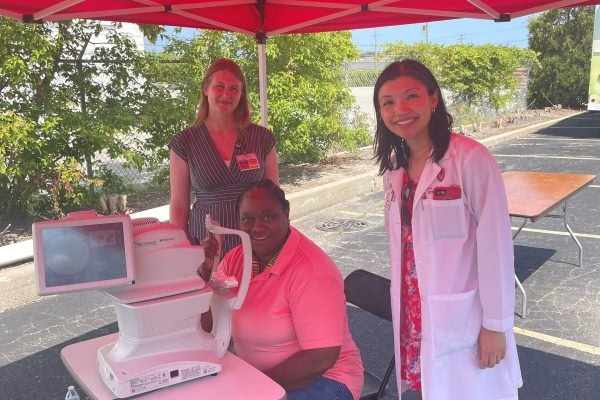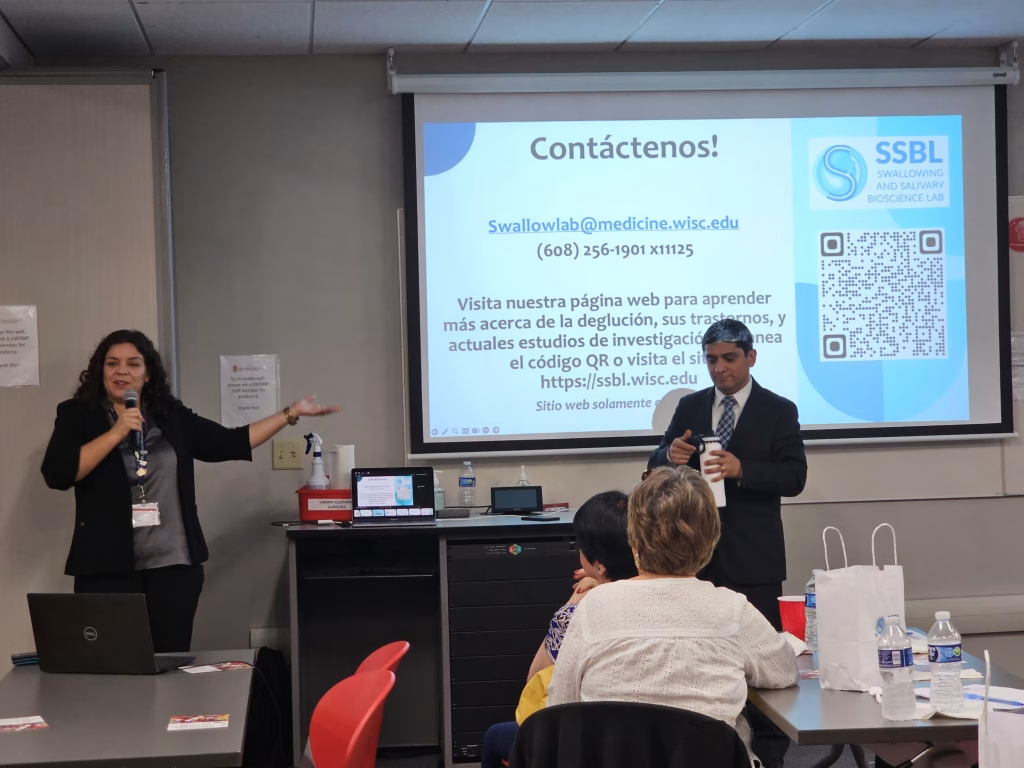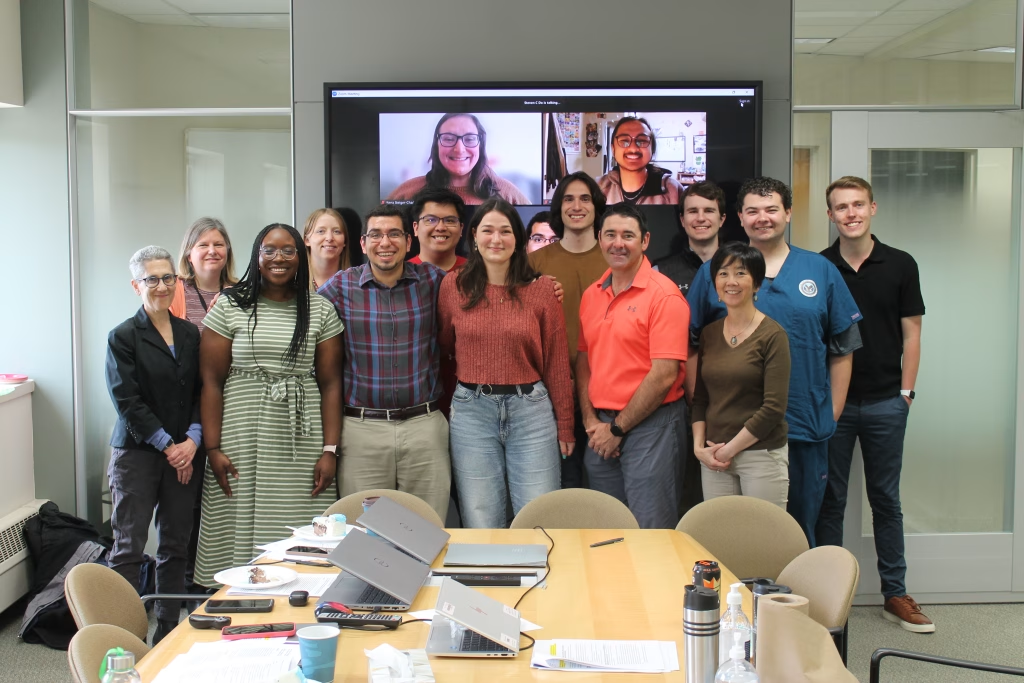The Academic Advisory Council consists of diverse faculty who integrate dissemination and implementation (D&I) frameworks and methods into their research and are dedicated to the ICTR D&I Launchpad‘s scientific and educational missions. They champion D&I within their departments and schools, expand D&I science across ICTR partner schools, and help prioritize the D&I Launchpad’s work, especially within CTSA hubs. Additionally, they provide insights on emerging strengths and needs at UW-Madison and nationally, contribute ideas for disseminating the D&I Launchpad’s work, and provide guidance for future D&I Short Courses.

Academic Advisory Council Chair
Dr. Christie Bartels is Chief of Rheumatology at University of Wisconsin and Chair of the American College of Rheumatology (ACR) Registry and Health IT Committee. As a rheumatologist and implementation researcher, her work aims to reduce cardiovascular disease (CVD) and disparities in lupus and rheumatic diseases. Her research has led to over 100 peer-reviewed publications and is cited in the US Cholesterol Guidelines and her specialty clinic CVD reduction protocols are recommended by the CDC and AHA Million Hearts program. She co-led the ACR-CDC project authoring the first lupus quality guidelines. Her team is now studying novel screening and outreach methods to improve care quality and equity. Bartels’ research has been funded by National Institutes of Health (NIH), Department of Defense, Rheumatology Research Foundation, WPP, and others. She serves on two editorial boards. She has received the Arthritis Foundation Community Impact Award, mentoring awards, and has repeatedly been listed with Top Doctors in America.

Specific interests include:
- Pragmatic ambulatory studies
- CVD prevention
- Lupus equity
- EHR outcome assessment
- Mixed methods

Dr. Ford is an Associate Professor in the School of Pharmacy. He is trained as a Health Systems Engineer whose research integrates health systems engineering principles, quality improvement tools and techniques with D&I principles, frameworks, and strategies. Using this infrastructure along with mixed methods, his research focuses on the dissemination, implementation, and sustainment of organizational change in behavioral health, and long-term care. By taking an active role in working directly with healthcare organizations, he is able to develop novel and tailored organizational-centric research implementation strategies. His research is supported by NIH, AHRQ, SAMHSA, as well as state and local funding organizations.

Specific interests include:
- External facilitation and its role in implementation science.
- Investigating the role of the community pharmacy in addressing the opioid epidemic.
- sustainment of organizational change.

Dr. Andy Garbacz is a Professor in the Department of Educational Psychology. His research focuses on (a) mental health promotion and (b) optimizing mental health interventions in school and community settings to center equity and justice, and improve adoption, implementation, and sustainment. Andy emphasizes development, testing, and scaling for dissemination family-centered and family-school partnership interventions to promote youth mental health.
Specific interests include:
- Intervention optimization.
- Hybrid designs.
- Adoption, implementation, and sustainment in applied community settings.

Dr. Barbara (Barb) King, Charlotte Jane and Ralph A. Rodefer Chair, is a professor in the UW-Madison School of Nursing. Her program of research aims to improve outcomes for hospitalized older adults. Dr. King is currently conducting an R01 AHRQ-funded study using a cluster randomized controlled trial design to test the effectiveness of Mobilizing Older adults Via a systems-based INtervention (MOVIN). Dr. King, along with her colleague Dr. Linsey Steege, created MOVIN to address barriers nursing staff experience that prevent them from getting adult patients up to walk during a hospital stay. Older adults, in particular, experience significant negative functional outcomes during hospitalization due to lack of ambulation. As an expert in qualitative methodology, using Grounded Theory, Dr. King has also conducted numerous studies investigating nurse decision-making to mobilize patients, the impact of hospital-based fall prevention strategies on nursing practice, and ambulation recovery in older adults post-discharge.

Dr. Yao Liu is the William and Phyllis Huffman Research Professor and an Associate Professor with tenure in the Department of Ophthalmology and Visual Sciences at the University of Wisconsin-Madison. She also serves as the Director of the UW Teleophthalmology Program, Glaucoma Service, and Glaucoma Fellowship. She is the Study Chair and Principal Investigator of a NEI-funded multicenter clinical trial, the I-TRUST Study (Implementation of Teleophthalmology in RUral Health SySTems), to sustain the effectiveness of telemedicine-based diabetic eye screening in rural primary care clinics using implementation science. Dr. Liu’s research seeks to advance health equity by reducing the burden of avoidable blindness and visual impairment in underserved communities nationwide. She completed medical school in the Harvard-MIT HST Program, a master’s degree in Clinical Investigation at UW-Madison, ophthalmology residency at Mass Eye and Ear, and glaucoma fellowship at the University of California-Davis Eye Center.

Specific interests include:
- Tailoring of implementation strategies.
- sustaining the effectiveness of clinic-based interventions.
- Incorporating health equity in implementation science through community engagement.

Dr. Megan Piper is a Professor in the University of Wisconsin Department of Medicine and is a Director of Research at the UW Center for Tobacco Research and Intervention (UW-CTRI). Dr. Piper is a named UW-CTRI Director of Research Professor. This five-year professorship reflects her strong scientific contributions and the collective efforts, achievements, and impact of the entire UW-CTRI team. This professorship provides funds that can be used to support UW-CTRI research, scholarship, and other UW-CTRI activities to advance the UW-CTRI research mission. Piper is a former president of the International Society for Research on Nicotine and Tobacco and former chair of the NIH’s Interventions to Prevent and Treat Addictions Study Section. In 2022, she was named a fellow of the Society for Research on Nicotine and Tobacco. In 2019, she was the recipient of the UW Faculty Excellence in Research Award. In 2014, Piper received the Russell-Jarvik Young Investigator Award for her contributions to the field from the Society for Research on Nicotine and Tobacco. She is a co-author of more than 180 papers.

Specific interests include:
- Implementing and optimizing smoking cessation treatments in primary care.
- Developing smoking cessation interventions in collaboration with the community.

Dr. Mora Pinzon is a physician-scientist, board certified in Preventive Medicine and Public Health. She graduated from the Universidad Central de Venezuela, Escuela Jose Maria Vargas in Caracas Venezuela, and completed her preventive medicine residency at the University of Wisconsin – Madison. She is currently an assistant professor on the tenure track at the University of Wisconsin – Madison, Department of Medicine, Division of Geriatrics and Gerontology. Her work seeks to improve healthcare access for patients living with dementias and their caregivers, particularly among Latino populations. She received a K99/R00 from the National Institute of Aging to fund her project “Improving Access to Alzheimer’s Disease and Related Dementia’s Care Services for Latinx Individuals at Community Health Clinics”, which is working with community health centers around the US to co-design new processes that can improve the care of individuals.

Specific interests include:
- Intersection of implementation science and community-based participatory research.
- Addressing health disparities and promoting health equity through the application of implementation science.
- Adaptation of evidence-based programs for inclusion of Latino communities.


Dr. Ed Portillo is an Assistant Professor at the University of Wisconsin – Madison School of Pharmacy and Clinical Pharmacist Practitioner (CPP) at the William S. Middleton Memorial Veterans Hospital where he practices in pulmonary medicine. Dr. Portillo’s research integrates dissemination and implementation science strategies to promote integration of COPD best practices within primary care. His research program, COPD CARE, positions pharmacists as prescribers for post-acute COPD management in rural settings. His program has been scaled nationally to 49 medical centers across the Department of Veterans Affairs as a VA Enterprise-Wide Initiative. Dr. Portillo also has the privilege of teaching in the School of Pharmacy Rural Pharmacy Practice Program, which is designed to prepare pharmacy students for a career serving patients living in rural communities.


Dr. Andrew Quanbeck is an associate professor in the University of Wisconsin’s Department of Family Medicine and Community Health. His research draws upon concepts from systems engineering to develop innovative approaches to implementing evidence-based practices, with a specific focus on implementation of interventions for the prevention and treatment of substance use disorders in medical care settings. He is currently principal investigator on four NIH-funded R01 grants using hybrid effectiveness-implementation study designs. He has been a standing member of NIH’s Science of Implementation in Health and Healthcare study section and is a current member of the Editorial Board of the journal Implementation Research and Practice.
Specific interests include:
- Systems engineering applications in D&I.
- Digital health implementation.
- Economic analysis in D&I.

Dr. Eduard E. Vasilevskis is a Professor of Medicine within the Division of Hospital Medicine at the University of Wisconsin – Madison. Dr. Vasilevskis completed his residency and fellowship training in health services research at UC San Francisco. This was followed by 15 years at Vanderbilt University, prior to his recent arrival at the University of Wisconsin, now serving as Division Chief. Dr. Vasilevskis’ research has focused on acute and post-acute care of older patients. Dr. Vasilevskis’ work has included the implementation of new care models to aid care transitions from the hospital to post-acute care settings, as well the care of the delirious patient. Dr. Vasilevskis was recently a co-PI for an NIA-sponsored trial that tested a patient-centered medication deprescribing protocol (ShedMEDS) among hospitalized older patients requiring ongoing post-acute care. His current work continues to evaluate delirium prevention interventions including an ongoing multisite pragmatic clinical trial (BEST-ICU) testing implementation strategies to enhance uptake of evidence-based delirium prevention and management processes in the ICU.
Specific interests include:
- Quality measurement and improvement methods with a focus on delirium and polypharmacy.
- Acute care model innovation and change.
- Pragmatic clinical trials.